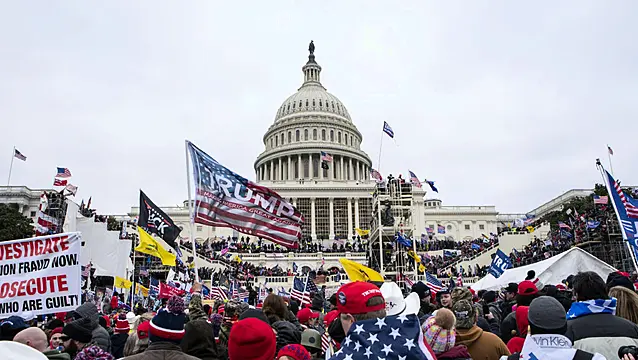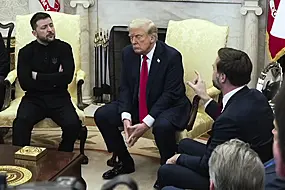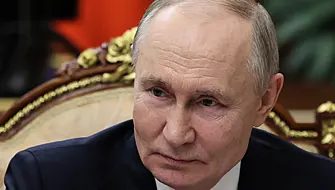The risk of political violence in the United States is "very real" ahead of November's presidential election, according to a US national security expert.
Professor Dakota Rudesill is an Associate Professor of Law, specialising in national security, at Ohio State University.
Currently in Ireland for the Kennedy Summer School in Co Wexford, Prof Rudesill spoke to BreakingNews.ie about the risk of political violence ahead of the November 5th US presidential election.
Prof Rudesill feels the risk of political violence in the US is as large as it was four years ago before the January 6th attacks, when supporters of former president Donald Trump stormed the US Capitol in a bid to stop the certification of Joe Biden as president.
Prof Rudesill explained that "self-organised" political violence is the main risk, rather than "individual vigilantes".
"I think we're at a larger point with that probably at any time since the 1960s and the civil rights movement, when there was armed resistance to efforts by the federal government to implement court decisions against racial segregation," he said.
Prof Rudesill said looking at how January 6th played out is the best way to examine the different threats of political violence.
"Essentially, I would say there were two or three categories of people who participated in the January 6th attacks.
"The hardest core groups, the self-organised political militias, the Proud Boys and the Oath Keepers. There were others from the Three Percenters, but mainly the first two."
Militias
He pointed to the organisation from these militias, particularly the leader of the Proud Boys, Stewart Rhodes, who had an "elaborate legal theory".
"He [Stewart Rhodes] is what I would call a partially educated historian of American law as it relates to the militia. He was a lawyer before being disbarred. That's why I say partially educated.
"He actually has a plausible legal theory, which is that under the Insurrection Act, the president of the US could put self-organised, partisan militias like this, on official federal duty to carry out political violence for the president.
"This embraces the founding era understanding of the US, which is the armed male citizenry. Unfortunately, there's one statute, the Insurrection Act, which has not been modernised along with most American law with regard to the militia.
"Around 100 years ago, Congress, using its powers over the militia, basically professionalised it into the National Guard. These are state-level professionalised reserve military forces that can be put on federal duty. They are very integrated and interoperable with the active duty military of the US."
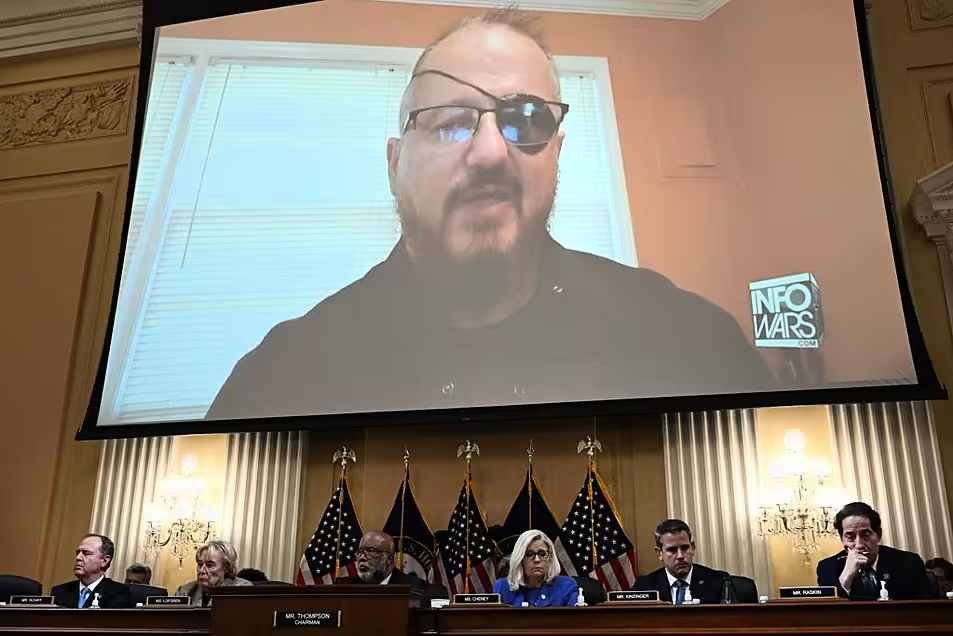
Prof Rudesill added: "Congress amended federal laws 100 years ago for the creation of the National Guard, with one exception my research has shown, that's the Insurrection Act.
"It still has this founding era term 'militia', which in theory could, as Stewart Rhodes requested of president Trump, allow the president to put armed men on official government duty and order them to use force for him.
"As I lay out in an article I am writing, I think there are good reasons if a president tried to do that, the courts should reject that."
He also pointed out that the Oath Keepers had a "large stash of weapons" at a hotel outside Washington DC, "ready for them to collect if shooting started".
"A second category was people who wanted to be part of a fantastical civil war. People who wanted a fight.
"The third category, the largest number, committed supporters of Trump and the MAGA movement. They were there because they were fooled by president Trump into believing there had been election fraud on a massive scale."
Prof Rudesill said January 6th is "a valuable framework for thinking about the risk of political violence going forward on the right".
"It's a combination of organised groups that are deadly and conscious of what they're doing, another set of people so upset that they are willing to engage in violence but not organised, then a larger group of people who are just unhappy and if violence develops they maybe jump in.
"There is also a violent contingent on the left. As the statistics show, the vast majority of violence and terrorism in the US comes from right-wing political violence. However, there are groups on the left, most famously Antifa.
"I think that threat is wildly inflated, mostly by right-wing media, but Anifta is there."

Prof Rudesill believes one big risk to a second Trump presidency, would be the Republican following through on indications he has given in the past about invoking the Insurrection Act when protests and riots get out of hand in US cities.
Mr Trump infamously considered doing this during the George Floyd protests which swept across the US after a Black man was murdered by police officers in Minneapolis in May 2020.
"There is nothing going on in the country which would justify sending the Armed Forces or National Guard on federal duty to do anything about domestic security.
"It would be catastrophic if there was significant political violence and the Armed Forces were distorted into a tool of repression against Americans.
"To be clear, nobody knows what a second Trump term would be like, but former president Trump and people close to him have said enough alarming things about using the Insurrection Act that a lot of people are rightly worried."
Prof Rudesill added that the US military would likely resist any such efforts, as they did during Mr Trump's presidency.
"When you look at the history of that moment, a really key part of the pushback was from the professional US military. General Mark Milley really challenged the basis for using the Insurrection Act.
"One would hope the institutional professional resistance to the use of force against the American people would be there again if we had such a situation."
While there is a tension across the United States about violence, Prof Rudesill said the biggest issue is still the level of political polarisation.
"The sad thing is there are a lot of Americans who have been living in a romantic fantasy world, of increasing intensity, that the country is on the verge of collapse, there's going to be Civil War, you need to be prepping.
'Overheated and partisan political system'
"It's a romantic fantasy. The US has a lot of significant problems to be clear, I would say the number one problem is our ridiculously overheated and divided partisan political system. That is the problem preventing us addressing issues that other countries have dealt with effectively.
"It would be tragic if people fantasising about social collapse and violence were to make that real.
"I think the risk of political violence is significant and worrisome, and if we can get through the election and next four years without it, I will be immensely relieved."
If Mr Trump were to lose to Kamala Harris, Prof Rudesill feels his potential refusal to accept the result could inflame tensions.
He pointed to a 2020 debate between Mr Trump and Joe Biden, in which Mr Trump told the Proud Boys to "stand back and stand by" when given the chance to condemn political violence.
However, Prof Rudesill pointed to one big reason he is less worried about violence being decisive in the outcome of the election than he was four years ago; that Mr Trump is now the challenger rather than the incumbent.
"When he was the incumbent, he was the commander in chief of the Armed Forces. This year, the risk is more private violence on his behalf."
He added: "Unless it is an overwhelming victory by one of the two candidates, it is likely there will be legal challenges. We could see those from either side, or both. It's looking like another very tight election so I think there's a good chance of that.
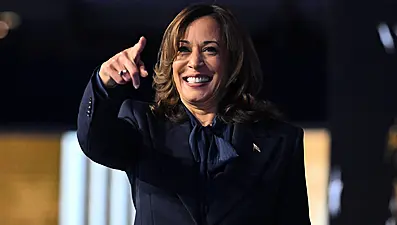
"Trump is well lawyered up and by all accounts his operation is much more professionalised than it was in the last two elections, so if it is close I think we'll see challenges in court which is fine.
"We have an imperfect, but very good legal system.
"What worries me is political violence, by private actors to try to interfere with voting, and bad faith."
For further details and tickets for the 2024 events, see www.kennedysummerschool.ie or call St Michael’s Theatre on 051 421255.
